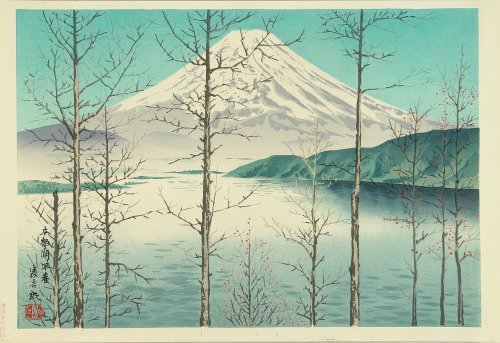An Early Spring :: Haiku of Japan #75
春や来し年や行きけん小晦日
haru ya koshi toshi ya yukiken kotsugomori
is spring here?
is the year over already?
second-to-last-day
—Basho
(Tr. David LaSpina)

("Early Spring" by Tokuriki Tomikichiro)
This is either Basho's first or second dated hokku, written when he was only 19. While it bears little similarity with his later hokku after he mastered the form, it does display his wit as well as his knowledge of prior poetry.
The old Japanese calendar was a lunar calendar in which the new year was celebrated with the beginning of spring. Here Basho is commenting that it seems Spring has begun but the calendar shows there are still 2 more days of winter.
He is also alluding to two older poems. The first, from Ariwara Motokawa:
During the old year
spring has come.
The remaining days:
should we call them
last year
or this year?
The second, from the Tale of Isa, a woman to her lover after their first meeting:
was it you who came
or I who went?
I don't remember
was it dream or reality?
was I asleep or awake?
New Years haiku present a small problem with our modern Western calendar. The time surrounding New Years is typically given as its own season in the haiku world, the 5th season—or more properly the 1st season. In the old Japanese calendar things were nice and neat: winter, New Years, spring. But now we have winter, New Years, more winter.
As far as problems go, this isn't a huge one, but when we are dealing with old New Years haiku that suggest spring is here, it does sound slightly odd to modern ears when for us New Years means another two long months of winter.
❦
| Don't miss other great haiku in the Haiku of Japan series! |
|---|
#1–10 — Haiku of Japan :: Collection #1
#11–20 — Haiku of Japan :: Collection #2
#21–30 — Haiku of Japan :: Collection #3
#31–40 — Haiku of Japan :: Collection #4
#41–50 — Haiku of Japan :: Collection #5
#51–60 — Haiku of Japan :: Collection #6
#61 — Turncoat Umbrella
#62 — Ten Autumns
#63 — Scattering Leaves
#64 — Gravekeeper
#65 — To Kill an Ant
#66 — Frosty Rose
#67 — Don't Give Up
#68 — Matsushima
#69 — Meeting With the Buddha
#70 — Winter Wind
#71 — Born Lucky
#72 — Late New Year's
#73 — New Year's Cleaning
#74 — Dreams of Turtles
| If you enjoyed this post, please like and resteem. Also be sure to follow me to see more from Japan everyday. |
|---|
I post one photo everyday, as well as a haiku and as time allows, videos, more Japanese history, and so on. Let me know if there is anything about Japan you would like to know more about or would like to see.
| Who is David? | |
|---|---|
 | David LaSpina is an American photographer lost in Japan, trying to capture the beauty of this country one photo at a time. |
The "problem" reminds me of Judaism. BTW, I wonder if it's truly a "lunar" calendar. A truly lunar calendar is the Muslim one, and the months rotate wildly around, as they have 13 months of 28 days.
The Jewish calendar is a mix of lunar and solar, and so the months follow the seasons.
Regarding what I said above, right now the Jewish calendar's "New Year" occurs between the end of August to the beginning of October, or lands in the fall. But it used to be when Passover was, a new year that marked Spring.
I think it is similar to Chinese new year. The traditional Chinese calendar is also the lunar calendar in which the new year is celebrated with the beginning of spring, so Chinese new year is called "Spring festival".
I love 2 older poems in the blog very much, too. I can feel them well. There's a Chinese poem sentence "江春入旧年" which is describing the same content as Basho's hokku(I doubt the difference between haiko and hokku).
@geekorner Yes, you're right. Both the old Japanese calendar and the old Chinese calendar are actually lunisolar calendars. They are the same as far as I'm aware. The Japanese borrowed it (as well as much else) from the Chinese long ago, only changing some things like the 二十四節気 (seasonal divisions) dates to better align with Japanese weather. I write lunar just out of convenience because I think most people probably have a basic idea of what that is, but would have no idea what a "lunisolar" calendar is.
@ginafraser I'm sorry, I sometimes throw around terms without defining them very well. I will write a separate article on that, but basically before Shiki (19th century) everyone was actually writing hokku and not haiku. Hokku was the first verse of a longer poem called renga. Shiki was a reformer and is the one who completely divided hokku from renga and renamed them to haiku. Often we use the two words interchangeably these days. Or actually sometimes in Japan they just use ku when referring to haiku/hokku to avoid any confusion.
It's interesting how most so-called "lunar calendars" are half-solar, to remain constant with the seasons.
Makes you wonder if the Muslim calendar is different because it originated in a culture that focused more on livestock than agriculture?
I am ignorant about muslim calendar. But I make sure Chinese calendar originated in the agricultural culture which is reflected in a lot of ancient Chinese poems.
Yes, which explains why it's half-solar.
A fully lunar calendar has 13 months of 28 days, and its holidays tend to be in a different Gregorian month, to quite some variation, every year, due to that.
dbooster!! Thank you, your Post. i upvoted.^^